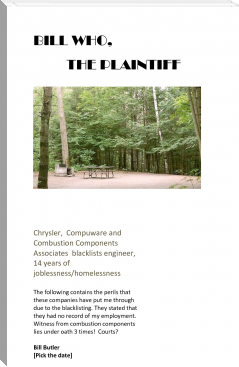The Story of Cole Younger, by Himself - Cole Younger (good novels to read in english .TXT) 📗

- Author: Cole Younger
Book online «The Story of Cole Younger, by Himself - Cole Younger (good novels to read in english .TXT) 📗». Author Cole Younger
on his rude coffin and died without a shudder; refusing with his last breath to forgive his executioners, and swearing he would ‘meet them and torment them in hell through all eternity.’ ”
“There was that helpless, half-idiot boy from Lewis county, who allowed himself to be blindfolded; then hearing Sidener and the others refuse, slipped up one corner of the bandage, and seeing the rest with their eyes uncovered, removed the handkerchief from his own, died as innocent as a lamb.”
“There were Humstead and Bixler, and Lake, and McPheeters.”
“And there was that most wondrous martyr of them all—young Smith, of Knox county—who died for another man.”
“Humphrey was the doomed man.”
“His heart-broken wife, in widow’s weeds, with her eight helpless little ones in deep mourning, that was only less black than the anguish they endured, or the heart of him to whom they appealed, rushed to the feet of McNeil, and in accents so piteous that a soul of adamant must have melted under it, besought him for the life of the husband and father.”
“She was brutally repulsed.”
“But Strachan, the monster of Shelby county, whom the angel a few months afterward smote with Herodian rottenness—Strachan, whose flesh literally fell from his living skeleton—Strachan, who has long been paying in the deepest, blackest, hottest hole in perdition the penalty of his forty-ply damnation-deserving crimes was provost marshal.”
“He saw the frantic agony of the woman; called her into his office and told her he would save her husband if she would give him three hundred dollars and then submit—but oh! humanity shudders, sickens at the horrid proposal.”
“The wretched, half-crazed, agonized wife, not knowing what she did—acceded to save her husband’s life—and the next morning she was found lying insane and nearly dead, with her baby at her breast, near the public spring at Palmyra.”
“And after all this, her husband was only released on condition that another should be shot in his place.”
“Young Smith was selected.”
“And then ensued a contest without a parallel in all the six thousand years of human history.”
“Humphrey refused to let any man die in his stead, declaring he should feel himself a murderer if he did.”
“Smith protested that he was only a poor orphan boy, and so far as he knew there was not a soul on earth to grieve for him; that Humphrey had a large family entirely dependent upon him for daily bread, and it was his duty to live while he could.”
“And Smith, the simple country lad, only seventeen years old, the Hero without a peer on all Fame’s mighty scroll, took his seat on a rough box—and was shot!”
“Will not God eternally damn his murderers?”
“We might dwell for hours on the incidents connected with this most frightful butchery of ancient or modern ages.”
“But why go on?”
“The murder was done!”
“The Confederate government talked of demanding the murderer McNeil.”
“Then a ‘memorial’ was gotten up, and signed by two thousand Missourians, recommending the heaven-earth-and-hell-accursed old monster, on account of his Palmyra massacre, to special favor and he was promoted to a brigadier-generalship.”
14. LAWRENCE
Disguised as a cattle trader, Lieutenant Fletcher Taylor, now a prominent and wealthy citizen of Joplin, Mo., spent a week at the Eldridge house in Lawrence, Kansas, from which place had gone out the Jayhawkers who in three months just previous had slain 200 men and boys, taken many women prisoners, and stolen no one knows how many horses.
At the house of Capt. Purdee on the Blackwater in Johnson county, 310 men answered August 16, 1863, to the summons of Capt. Quantrell to hear the report of Lieut. Taylor’s reconnaissance.
The lieutenant’s report was encouraging. The city itself was poorly garrisoned; the camp beyond was not formidable; the streets were wide.
“You have heard the report,” said Quantrell when the lieutenant finished. “It is a long march; we march through soldiers; we attack soldiers; we must retreat through soldiers. What shall it be? Speak out. Anderson!”
“Lawrence or hell,” relied Anderson, instantly. With fire flashing in his eyes as he recalled the recent wreck from which his sister had been taken in Kansas City, he added: “But with one proviso, that we kill every male thing.”
“Todd?” called Quantrell.
“Lawrence, if I knew that not a man would get back alive.” “Gregg?”
This was Capt. William Gregg, who still lives in Kansas City, one of the bravest men that ever faced powder, and in action the coolest, probably, in the entire command.
“Lawrence,” he relied. “It is the home of Jim Lane; the nurse of Jayhawkers.”
“Jarrette?”
“Lawrence, by all means,” my brother-in-law answered. “It is the head devil of the killing and burning in Jackson county. I vote to fight it and with fire burn it before we leave.”
Shepherd, Dick Maddox, so on, Quantrell called the roll.
“Have you all voted?” shouted Quantrell.
There was no word.
“Then Lawrence it is; saddle up.”
We reached Lawrence the morning of the 21st. Quantrell sent me to quiz an old farmer who was feeding his hogs as to whether there had been any material changes in Lawrence since Lieut. Taylor had been there. He thought there were 75 soldiers in Lawrence; there were really 200.
Four abreast, the column dashed into the town with the cry:
“The camp first!”
It was a day of butchery. Bill Anderson claimed to have killed fourteen and the count was allowed. But it is not true that women were killed. One negro woman leaned out of a window and shouted:
“You—of—.”
She toppled out dead before it was seen she was a woman.
The death list that day is variously estimated at from 143 to 216 and the property loss by the firing of the town, the sacking of the bank, and the rest, at $1,500.000.
Maj. John N. Edwards, in his _Noted Guerrillas,_ says:
“Cole Younger saved at least a dozen lives this day. Indeed, he killed none save in open and manly battle. At one house he captured five citizens over whom he put a guard and at another three whom he defended and protected. The notorious Gen. James H. Lane, to get whom Quantrell would gladly have left and sacrificed all the balance of the victims, made his escape through a corn-field, hotly pursued but too splendidly mounted to be captured.”
My second lieutenant, Lon Railey, and a detachment gave Jim Lane a hot chase that day but in vain.
When I joined Brother-in-law Jarrette’s company, he said:
“Cole, your mother and your sister told me to take care of you.”
That day it was reversed. Coming out of Lawrence his horse was shot under him. He took the saddle off and tried to put it on a mustang that one of the boys was leading. Some of the boys say he had $8,000 in the saddle bags for the benefit of the widows and orphans of Missouri, but whether that is true or not I have no knowledge. While he was trying to saddle the mustang, he was nearly surrounded by the enemy. I dashed back and made him get up behind me. The saddle was left for the Kansas men.
One of the treasures that we did bring out of Lawrence that day, however, was Jim Lane’s “black flag,” with the inscription “Presented to Gen. James H. Lane by the ladies of Leavenworth”.
That is the only black flag that I knew anything about in connection with the Lawrence raid.
Lawrence was followed by a feverish demand from the North for vengeance. Quantrell was to be hanged, drawn and quartered, his band annihilated; nothing was too terrible for his punishment.
Four days after the raid, Gen. Thomas Ewing at St. Louis issued his celebrated General Order No. 11. This required that all persons living in Jackson, Cass and Bates counties, except one township, or within one mile of a military post, should remove within fifteen days. Those establishing their loyalty were permitted to go within the lines of any military post, or to Kansas, but all others were to remove without the bounds of the military district. All grain and hay in the proscribed district was to be turned into the military post before Sept. 9, and any grain or hay not so turned in was to be destroyed.
It was the depopulation of western Missouri. Any citizen not within the limits of the military post after Sept. 9 was regarded as an outlaw.
Pursued by 6,000 soldiers, the Confederates in that vicinity must ultimately rejoin their army farther south, but they harassed their pursuers for weeks in little bands rarely exceeding ten.
The horrors of guerrilla warfare before the raid at Lawrence, were eclipsed after it. Scalping, for the first time, was resorted to.
Andy Blunt found Ab. Haller’s body, so mutilated, in the woods near Texas Prairie on the eastern edge of Jackson county.
“We had something to learn yet,” said Blunt to his companions, “and we have learned it. Scalp for scalp hereafter.”
Among the brave fighters who were participants in the fight at Lawrence were Tom Maupin, Dick Yager, Payne Jones, Frank Shepherd, Harrison Trow, Dick Burns, Andy McGuire and Ben Broomfield.
15. CHASING COTTON THIEVES
In the fall of 1863, in the absence of Capt. Jarrette, who had rejoined Shelby’s command, I became, at 19, captain of the company. Joe Lea was first lieutenant and Lon Railey second lieutenant.
When Capt. Jarrette came north again, I again became lieutenant, but when Capts. Jarrette and Poole reported to Gen. Shelby on the Red river, they were sent into Louisiana, and I again became captain of the company, so reporting to Gen. Henry E. McCulloch in command of Northern Texas at Bonham. All my orders on the commissary and quartermaster’s departments were signed by me as Capt. C.S.A. and duly honored.
Around Bonham I did scout service for Gen. McCulloch, and in November he sent me with a very flattering letter to report to Gen. E. Kirby Smith, at Shreveport, Louisiana, the headquarters of the Trans-Mississippi department. Capts. Jarrette and Poole were at Shreveport and Gen. Smith gave us minute orders for a campaign against the cotton thieves and speculators who infested the Mississippi river bottom. An expedition to get rid of these was planned by Gen. Smith with Capt. Poole commanding one company, myself the other, and Capt. Jarrette over us both.
Five miles from Tester’s ferry on Bayou Macon we met a cotton train convoyed by 50 cavalry. We charged them on sight. The convoy got away with ten survivors, but every driver was shot, and four cotton buyers who were close behind in an ambulance were hung in a cotton gin near at hand. They had $180,000 on them, which, with the cotton and wagons, was sent back to Bastrop in charge of Lieut. Greenwood.
A more exciting experience was mine at Bayou Monticello, a stream that was deeper than it looked. Observing a cotton train on a plantation across the bayou, I called to my men to follow me and plunged in.
Seeing me floundering in the deep water, however, they went higher up to a bridge, and when I landed I found myself alone. I was hard pressed for a time, till they came up and relieved me. There
“There was that helpless, half-idiot boy from Lewis county, who allowed himself to be blindfolded; then hearing Sidener and the others refuse, slipped up one corner of the bandage, and seeing the rest with their eyes uncovered, removed the handkerchief from his own, died as innocent as a lamb.”
“There were Humstead and Bixler, and Lake, and McPheeters.”
“And there was that most wondrous martyr of them all—young Smith, of Knox county—who died for another man.”
“Humphrey was the doomed man.”
“His heart-broken wife, in widow’s weeds, with her eight helpless little ones in deep mourning, that was only less black than the anguish they endured, or the heart of him to whom they appealed, rushed to the feet of McNeil, and in accents so piteous that a soul of adamant must have melted under it, besought him for the life of the husband and father.”
“She was brutally repulsed.”
“But Strachan, the monster of Shelby county, whom the angel a few months afterward smote with Herodian rottenness—Strachan, whose flesh literally fell from his living skeleton—Strachan, who has long been paying in the deepest, blackest, hottest hole in perdition the penalty of his forty-ply damnation-deserving crimes was provost marshal.”
“He saw the frantic agony of the woman; called her into his office and told her he would save her husband if she would give him three hundred dollars and then submit—but oh! humanity shudders, sickens at the horrid proposal.”
“The wretched, half-crazed, agonized wife, not knowing what she did—acceded to save her husband’s life—and the next morning she was found lying insane and nearly dead, with her baby at her breast, near the public spring at Palmyra.”
“And after all this, her husband was only released on condition that another should be shot in his place.”
“Young Smith was selected.”
“And then ensued a contest without a parallel in all the six thousand years of human history.”
“Humphrey refused to let any man die in his stead, declaring he should feel himself a murderer if he did.”
“Smith protested that he was only a poor orphan boy, and so far as he knew there was not a soul on earth to grieve for him; that Humphrey had a large family entirely dependent upon him for daily bread, and it was his duty to live while he could.”
“And Smith, the simple country lad, only seventeen years old, the Hero without a peer on all Fame’s mighty scroll, took his seat on a rough box—and was shot!”
“Will not God eternally damn his murderers?”
“We might dwell for hours on the incidents connected with this most frightful butchery of ancient or modern ages.”
“But why go on?”
“The murder was done!”
“The Confederate government talked of demanding the murderer McNeil.”
“Then a ‘memorial’ was gotten up, and signed by two thousand Missourians, recommending the heaven-earth-and-hell-accursed old monster, on account of his Palmyra massacre, to special favor and he was promoted to a brigadier-generalship.”
14. LAWRENCE
Disguised as a cattle trader, Lieutenant Fletcher Taylor, now a prominent and wealthy citizen of Joplin, Mo., spent a week at the Eldridge house in Lawrence, Kansas, from which place had gone out the Jayhawkers who in three months just previous had slain 200 men and boys, taken many women prisoners, and stolen no one knows how many horses.
At the house of Capt. Purdee on the Blackwater in Johnson county, 310 men answered August 16, 1863, to the summons of Capt. Quantrell to hear the report of Lieut. Taylor’s reconnaissance.
The lieutenant’s report was encouraging. The city itself was poorly garrisoned; the camp beyond was not formidable; the streets were wide.
“You have heard the report,” said Quantrell when the lieutenant finished. “It is a long march; we march through soldiers; we attack soldiers; we must retreat through soldiers. What shall it be? Speak out. Anderson!”
“Lawrence or hell,” relied Anderson, instantly. With fire flashing in his eyes as he recalled the recent wreck from which his sister had been taken in Kansas City, he added: “But with one proviso, that we kill every male thing.”
“Todd?” called Quantrell.
“Lawrence, if I knew that not a man would get back alive.” “Gregg?”
This was Capt. William Gregg, who still lives in Kansas City, one of the bravest men that ever faced powder, and in action the coolest, probably, in the entire command.
“Lawrence,” he relied. “It is the home of Jim Lane; the nurse of Jayhawkers.”
“Jarrette?”
“Lawrence, by all means,” my brother-in-law answered. “It is the head devil of the killing and burning in Jackson county. I vote to fight it and with fire burn it before we leave.”
Shepherd, Dick Maddox, so on, Quantrell called the roll.
“Have you all voted?” shouted Quantrell.
There was no word.
“Then Lawrence it is; saddle up.”
We reached Lawrence the morning of the 21st. Quantrell sent me to quiz an old farmer who was feeding his hogs as to whether there had been any material changes in Lawrence since Lieut. Taylor had been there. He thought there were 75 soldiers in Lawrence; there were really 200.
Four abreast, the column dashed into the town with the cry:
“The camp first!”
It was a day of butchery. Bill Anderson claimed to have killed fourteen and the count was allowed. But it is not true that women were killed. One negro woman leaned out of a window and shouted:
“You—of—.”
She toppled out dead before it was seen she was a woman.
The death list that day is variously estimated at from 143 to 216 and the property loss by the firing of the town, the sacking of the bank, and the rest, at $1,500.000.
Maj. John N. Edwards, in his _Noted Guerrillas,_ says:
“Cole Younger saved at least a dozen lives this day. Indeed, he killed none save in open and manly battle. At one house he captured five citizens over whom he put a guard and at another three whom he defended and protected. The notorious Gen. James H. Lane, to get whom Quantrell would gladly have left and sacrificed all the balance of the victims, made his escape through a corn-field, hotly pursued but too splendidly mounted to be captured.”
My second lieutenant, Lon Railey, and a detachment gave Jim Lane a hot chase that day but in vain.
When I joined Brother-in-law Jarrette’s company, he said:
“Cole, your mother and your sister told me to take care of you.”
That day it was reversed. Coming out of Lawrence his horse was shot under him. He took the saddle off and tried to put it on a mustang that one of the boys was leading. Some of the boys say he had $8,000 in the saddle bags for the benefit of the widows and orphans of Missouri, but whether that is true or not I have no knowledge. While he was trying to saddle the mustang, he was nearly surrounded by the enemy. I dashed back and made him get up behind me. The saddle was left for the Kansas men.
One of the treasures that we did bring out of Lawrence that day, however, was Jim Lane’s “black flag,” with the inscription “Presented to Gen. James H. Lane by the ladies of Leavenworth”.
That is the only black flag that I knew anything about in connection with the Lawrence raid.
Lawrence was followed by a feverish demand from the North for vengeance. Quantrell was to be hanged, drawn and quartered, his band annihilated; nothing was too terrible for his punishment.
Four days after the raid, Gen. Thomas Ewing at St. Louis issued his celebrated General Order No. 11. This required that all persons living in Jackson, Cass and Bates counties, except one township, or within one mile of a military post, should remove within fifteen days. Those establishing their loyalty were permitted to go within the lines of any military post, or to Kansas, but all others were to remove without the bounds of the military district. All grain and hay in the proscribed district was to be turned into the military post before Sept. 9, and any grain or hay not so turned in was to be destroyed.
It was the depopulation of western Missouri. Any citizen not within the limits of the military post after Sept. 9 was regarded as an outlaw.
Pursued by 6,000 soldiers, the Confederates in that vicinity must ultimately rejoin their army farther south, but they harassed their pursuers for weeks in little bands rarely exceeding ten.
The horrors of guerrilla warfare before the raid at Lawrence, were eclipsed after it. Scalping, for the first time, was resorted to.
Andy Blunt found Ab. Haller’s body, so mutilated, in the woods near Texas Prairie on the eastern edge of Jackson county.
“We had something to learn yet,” said Blunt to his companions, “and we have learned it. Scalp for scalp hereafter.”
Among the brave fighters who were participants in the fight at Lawrence were Tom Maupin, Dick Yager, Payne Jones, Frank Shepherd, Harrison Trow, Dick Burns, Andy McGuire and Ben Broomfield.
15. CHASING COTTON THIEVES
In the fall of 1863, in the absence of Capt. Jarrette, who had rejoined Shelby’s command, I became, at 19, captain of the company. Joe Lea was first lieutenant and Lon Railey second lieutenant.
When Capt. Jarrette came north again, I again became lieutenant, but when Capts. Jarrette and Poole reported to Gen. Shelby on the Red river, they were sent into Louisiana, and I again became captain of the company, so reporting to Gen. Henry E. McCulloch in command of Northern Texas at Bonham. All my orders on the commissary and quartermaster’s departments were signed by me as Capt. C.S.A. and duly honored.
Around Bonham I did scout service for Gen. McCulloch, and in November he sent me with a very flattering letter to report to Gen. E. Kirby Smith, at Shreveport, Louisiana, the headquarters of the Trans-Mississippi department. Capts. Jarrette and Poole were at Shreveport and Gen. Smith gave us minute orders for a campaign against the cotton thieves and speculators who infested the Mississippi river bottom. An expedition to get rid of these was planned by Gen. Smith with Capt. Poole commanding one company, myself the other, and Capt. Jarrette over us both.
Five miles from Tester’s ferry on Bayou Macon we met a cotton train convoyed by 50 cavalry. We charged them on sight. The convoy got away with ten survivors, but every driver was shot, and four cotton buyers who were close behind in an ambulance were hung in a cotton gin near at hand. They had $180,000 on them, which, with the cotton and wagons, was sent back to Bastrop in charge of Lieut. Greenwood.
A more exciting experience was mine at Bayou Monticello, a stream that was deeper than it looked. Observing a cotton train on a plantation across the bayou, I called to my men to follow me and plunged in.
Seeing me floundering in the deep water, however, they went higher up to a bridge, and when I landed I found myself alone. I was hard pressed for a time, till they came up and relieved me. There
Free e-book «The Story of Cole Younger, by Himself - Cole Younger (good novels to read in english .TXT) 📗» - read online now
Similar e-books:





Comments (0)